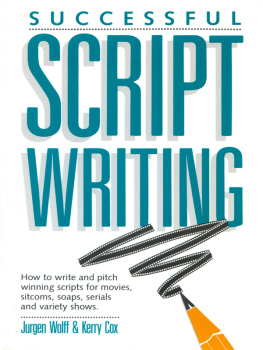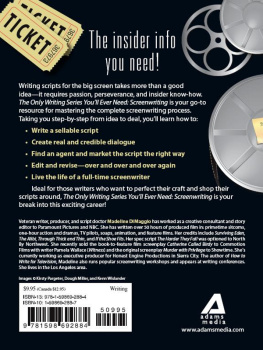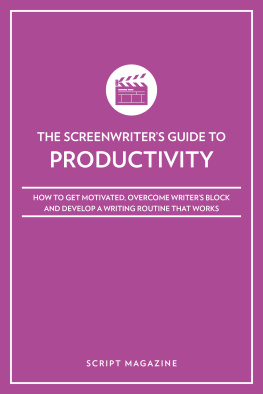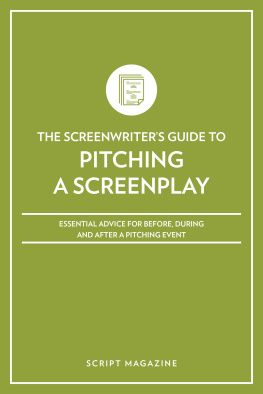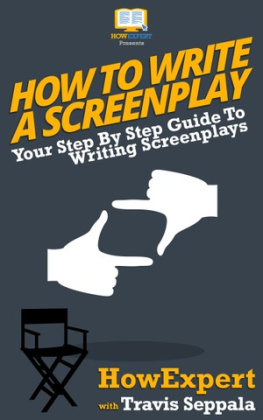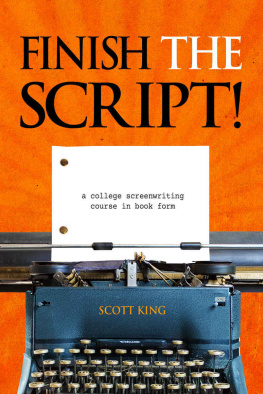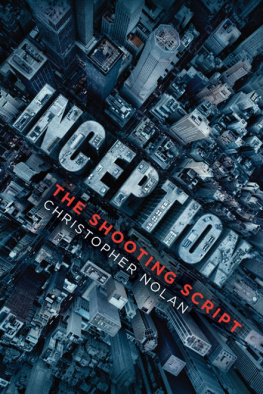SUCCESSFUL SCRIPTWRITING
Jurgen Wolff
AND
Kerry Cox

WRITERs DIGEST BOOKS
Cincinnati, Ohio
Successful Scriptwriting. Copyright 1988 by Jurgen Wolff and Kerry Cox. Printed and bound in the United States of America. All rights reserved. No part of this book may be reproduced in any form or by any electronic or mechanical means including information storage and retrieval systems without permission in writing from the publisher, except by a reviewer, who may quote brief passages in a review. Published by Writers Digest Books, an imprint of F&W Publications, Inc., 1507 Dana Ave., Cincinnati, Ohio 45207. (800) 289-0963. First edition. First paperback printing 1991.
Other fine Writers Digest Books are available from your local bookstore or direct from the publisher.
Visit our Web site at www.writersdigest.com for information on more resources for writers.
To receive a free weekly E-mail newsletter delivering tips and updates about writing and about Writers Digest products, send an E-mail with the message Subscribe Newsletter to newsletter-request@writersdigest. com, or register directly at our Web site at www.writersdigest.com.
Library of Congress Cataloging-in-Publication Data
Cox, Kerry
Successful scriptwriting.
Bibliography: p.
1. Motion picture playsTechnique. 2. Television playsTechnique. 3. Motion picture authorship. 4. Playwriting. I. Wolff, Jurgen M. (Jurgen Michael), 1948-. II. Title
PN1996.C818 1988 808.23 88-10769
ISBN 0-89879-449-8 paperback
ISBN 0-89879-325-4 casebound
Design by Christine Aulicino
To the memory of Lester Cole: screenwriter, teacher, and member of the Hollywood Ten.
J. W.
To Leah, Rachel, and the one on the way.
K. C.
ACKNOWLEDGMENTS
We wish to thank all those who allowed their interviews to be used in this book; Scott Reneau, the former editor of The Hollywood Scriptwriter who conducted a number of the interviews and contributed to the format section of the chapter on writing features; Rose Berman of RSB Enterprises for her public relations services; Jim Heacock of Heacock Literary Agency for his support and professional efforts; and Kirk Sullivan for his administrative support.
CONTENTS
CHAPTER 1
Introduction
CHAPTER 2
How to Check the Salability of Your Idea
Ask yourself: does your story have a book? Is it topical, fresh, and meaningful? Does it have strong, involving conflict and a clear-cut, positive ending? If it were sold and produced, would it be easy to cast, with strong visual values? Use the checklist to be sure.
CHAPTER 3
How to Structure Your Plot
Understand and use the fundamentals of the three-act structure. Study outlines of E. T. and Ordinary People to see how three-act script structure works.
From the Pros: Tim McCanlies on hoosing and developing a subject.
CHAPTER 4
How to Create Three-Dimensional Characters
Get to know all about your characters and then show them in action. Make them real, whether or not theyre based on actual people. Build viewer identification by letting viewers understand your characters motivationeven when it isnt 100% admirable. Give your characters vivid, lifelike dialogue.
From the Pros: Stirling Silliphant on successful characterization.
Alvin Sargent on how your characters can surprise you.
CHAPTER 5
How to Write Outlines and Treatments
Know what outlines and treatments are, and when theyre required in the scripting process. Write treatments that sparkle: learn the techniques by reading the sample treatment for Camp Wildlife.
CHAPTER 6
How to Write Feature Film Scripts
Go from basic format to writing effective scenes, with interesting action played out against colorful, meaningful settings. Describe your characters, but dont try to specify every wink and turn of the camera!
From the Pros: Colin Higgins on writing feature film scripts.
Larry Gelbart on writing comedy scripts, original and adapted, for stage, film, and television production.
CHAPTER 7
How to Write Movies-of-the-Week
Know how the constraints of budget, subject, length, and structure must affect your script for a television movie. To sell your idea, youll need an outline: study the sample for Two Guns.
From the Pros: Len Hill on producing movies for TV.
CHAPTER 8
How to Write Hour-Long Series Scripts
Learn the structure of a one-hour show and how to fit in all those commercials! Add your contribution, an episode for an ongoing TV series, without changing the rules (and roles) that have made the series successful.
From the Pros: Steven Bochco on the development of series TV in general and Hill Street Blues in particular.
Robert Van Scoyk on script continuity and keeping Murder She Wrote alive and detecting.
CHAPTER 9
How to Write Situation Comedies
Writing a sitcom begins with a sample script for an imaginary episode of one of the top showsto show what you can do. Your sample script must show your understanding of two-act sitcom structure and your ability to create effective verbal and physical humor with an accent on the visual.
From the Pros: William Bickley on how outside writers can sell scripts to a running sitcom like Perfect Strangers.
CHAPTER 10
How to Write for Daytime Serials (Soaps)
Learn how a serials head writer breaks down the storys long-range and short-range action and developments for the associate writers to build into scripts.
From the Pros: Robert J. Shaw on what its like to write for a soap, and what personal and professional qualities are needed to be successful.
CHAPTER 11
How to Write for Animation
Learning the structure of an animation script and understanding whats hard (avoid) and whats easy (cheap!) will help you put together salable, appealing scripts with high visual impact.
From the Pros: Kayte Kuch and Sheryl Scarborough on the demanding craft of writing for animation and how beginners should go about breaking in.
CHAPTER 12
How to Write for Variety Shows
Make the contacts, and understand the dynamics and components of specials and variety shows, to work in this exclusive but exciting show business format.
From the Pros: Gary Smith on developing specials showcasing the special talents of performers like Shirley MacLaine, Paul McCartney, or Ben Vereen.
CHAPTER 13
How to Create a New Series
Are the networks waiting for your brand-new series, even if they dont yet know it? what are they looking for? How do you approach them, and who should you contact? What will happen if they like your idea? How do you judge whether your great idea could be a great series? Study the sample series presentation BAs in Blue to learn what counts.
From the Pros: Larry Lyttle on how network Program Development executives judge if a writers new series proposal should be encouraged, developed, bought, and produced.
CHAPTER 14
How to Collaborate
Collaboration may be twice the fun and productivity, but half the money: know the advantages and drawbacks before you hitch up with a partner.
From the Pros: Vida Spears and Sarah Finney on how they developed and now maintain their successful sitcom-writing partnership.
Next page
